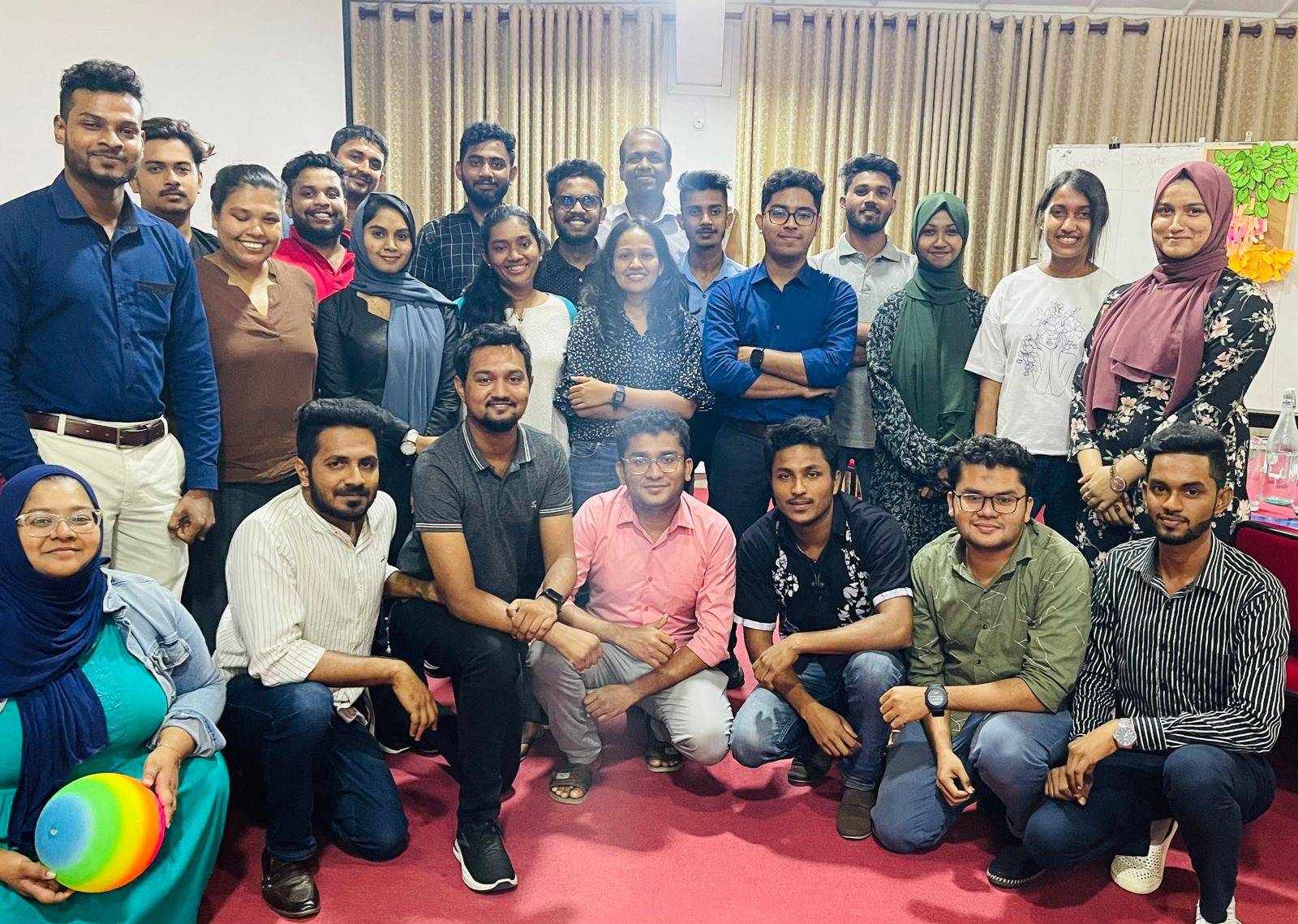
Youth Leadership for Climate Action (YLCA)
Biodiversity Sri Lanka (BSL) is carrying out an initiative called Youth Leadership for Climate Action (YLCA), targeting young people living in the Colombo district. The British Council is funding this program to develop young people into community leaders in climate action. The project includes a residential training program; either individually or in groups, the candidates must undertake a community intervention. BSL and CurveUp (Pvt) Ltd., are conducting the training sessions collaboratively.
Climate change is a significant issue for Sri Lanka and both human and natural systems could be impacted by its effects. In Sri Lanka, there are about 2.6 million young people, between the ages of 18 and 25 A quarter of the entire population would be considered young if the age range was expanded to include those between 15 and 29 years.
The British Council conducted a study in 2021 and discovered that while young people in Sri Lanka are generally aware of climate change, the majority lack a technical understanding and in-depth knowledge of the subject. The survey also found a lack of opportunities and platforms for youth to take initiatives and make decisions on climate change, as well as a lack of openness among state and non-state community stakeholders to up-take initiatives from young people.
As Sri Lankan youth showed a strong interest in learning more about climate change, the majority of them think that their thoughts and actions today will have an impact later on. This suggested that both governmental and non-governmental actors might engage with young people, enhance climate-related education and training, and offer them chances to take climate action.
In partnership with the British Council, BSL is giving a chance to Sri Lankan youth involved in local climate action (mitigation and adaptation) to expand their knowledge, expertise, and networks in order to provide better, more significant, and sustainable solutions to urgent social, economic, and environmental climate-related issues by involving local communities through the “Youth Leadership for Climate Action (YCA)” project.
YLCA project has its specific objective to enhance the knowledge and capabilities of youth for more effective and inclusive climate action through social mobilization.
The project will have four outcomes,
- Improved Knowledge, Skills and Connections of youth for community-level Climate action.
- Effective and Inclusive Climate Action Plans are developed and implemented by youth.
- Fellow youth are inspired and motivated towards favorable Climate action through shared experiences.
- Stakeholder support, collaboration, and recognition for youth Climate action.
This project is based in Colombo, and all youth community interventions are taking place in Colombo. Training for youth capacity-building is now being conducted, and the entire project will be completed by the end of March 2023.
Keep in touch with us for more updates on this fascinating program!
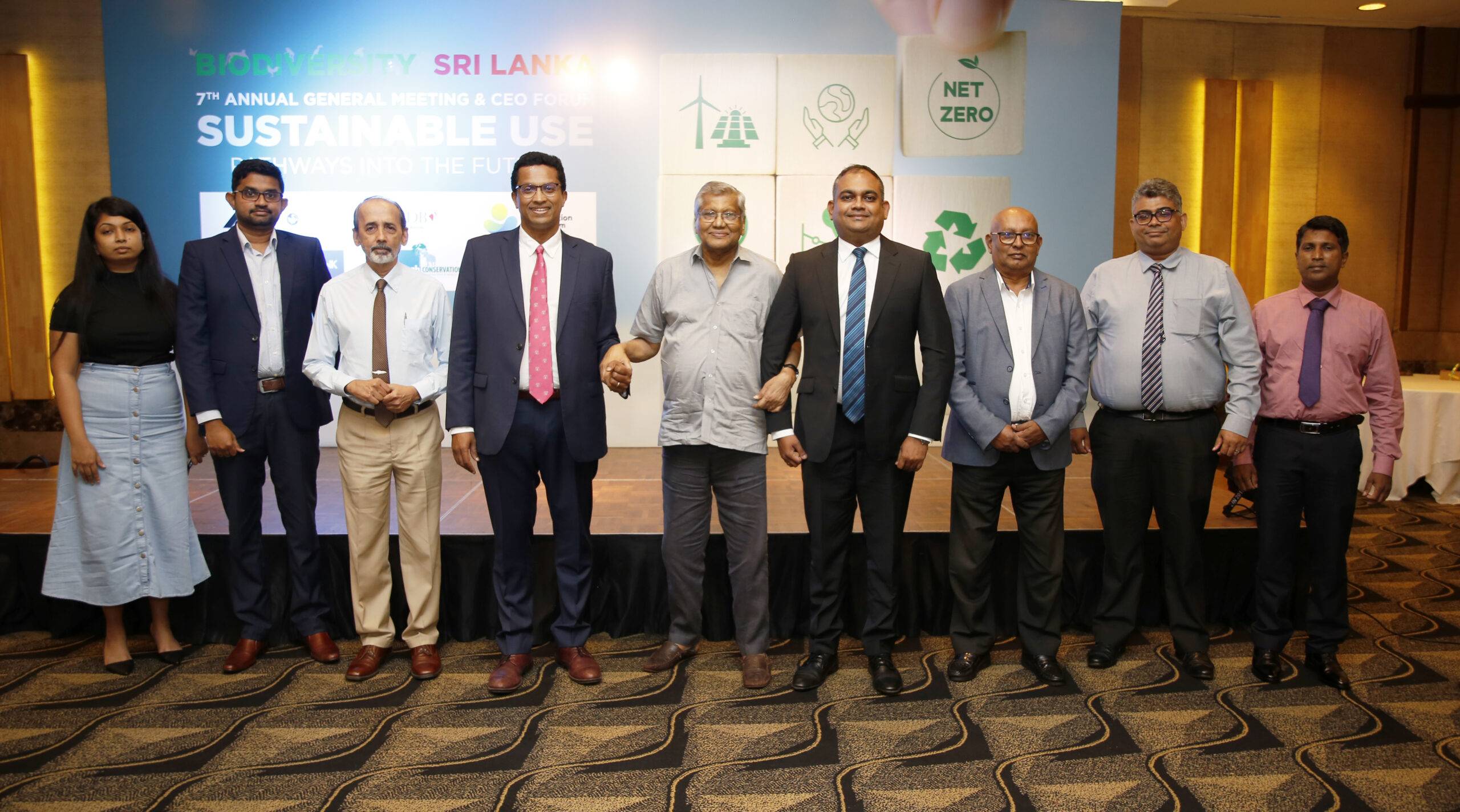
BSL holds its 7th Annual General Meeting
Biodiversity Sri Lanka held its 7th Annual General Meeting on November 3rd, 2022 at Ramada Colombo. The event was held physically after a two-year virtual hiatus due to the escalation of the COVID-19 pandemic.
At the meeting, a new Board of Directors was appointed. They are Mr. Dilhan C. Fernando, CEO of Dilmah Ceylon Tea Company and Trustee of Dilmah Conservation (Chair), Mr. Shiran Fernando, Chief Economist, Ceylon Chamber of Commerce, Mr. Anshuman Saikia, Coordinator, Regional Portfolio Management and Officer in Charge, IUCN Sri Lanka, Mr. Ranjith Pandithage, Chairman, DIMO, Mr. Hasrath Munasinghe, Deputy General Manager Marketing, Commercial Bank of Ceylon PLC, Ms. Sayuri Daluwatte, Group Chief Operations Officer, Jinasena (PVT) LTD. Mr. Lasitha Wimalaratne, Chief Executive Officer, HNB Assurance PLC. Mr. Prema Cooray, Chairman of Rainforest Ecolodge and a pioneer in the tourism and hospitality sector in the country, will continue to function as a Director/Chief Executive Officer. Dr. Rohan Pethiyagoda, Sri Lanka’s leading naturalist and taxonomist of freshwater fish of Sri Lanka was subsequently appointed as a Director being a person who has rendered outstanding service towards the fulfillment of the objects of the Association or who has proven expertise and/or standing in the field of business, sustainability and the environment in terms of Article 13.5 of the Articles of Association of BSL.
The Chairman, on behalf of the Secretariat, also took the opportunity to thank the outgoing members of the Board of Directors, including Mr. Nandana Ekanayake – Chairman of Siam City Cement (Lanka) Ltd., Mr. Mahesh Nanayakkara, Chief Executive Officer and Managing Director of Citizens’ Development Business Finance PLC., Mr. Shahid Mohomed Sangani, Director of Dynawash Ltd. and Mr. Subramaniam Eassuwaren – Deputy Chairman of Eswaran Brothers Exports (PVT) Ltd., for their outstanding service rendered towards the upliftment of the platform’s status, recognition, and effectiveness. Their services over the past two years have been of immense support and will no doubt be remembered and much appreciated over the years to come in this long journey we foresee.
Two of the past Directors who have served the platform diligently since its inception will no longer be with the board in the upcoming financial year. Dr. Ananda Mallawatantri retired from office as Country Representative of IUCN Sri Lanka in September 2022. He served on the Board, representing initiating partner IUCN from its inception. His untiring efforts towards the upliftment of BSL was recognized before the full membership of the Association.
Mr. Chandrarathne Vithanage, Senior Assistant Secretary General of the Ceylon Chamber of Commerce is also due to retire by the end of this year. He has been a strength from the inception of the Platform and has encouraged the staff in very many ways, giving them leadership in a number of initiatives that BSL has undertaken together with the CCC.
The former Secretary of the Ministry of Environment and present Secretary to the Prime Minister – Mr. Anura Dissanayake also left the board, in his capacity on the Board of Directors as a person who has rendered outstanding service towards the fulfillment of the objects of the Association with proven expertise and standing in the fields of business, sustainability and the environment. His current assignment as Secretary to the Prime Minister keeps him extremely busy in managing the country during these turbulent times and hence has requested that he be excluded from the Board of Directors for the next session.
The meeting was attended by a majority of BSL’s membership across all categories – Patron, General, SME and Associate. Sponsors of the event were American and Efird Lanka (Pvt.) Ltd., Citizens Development Business Finance PLC, Climate & Conservation Consortium, Commercial Bank of Ceylon PLC, Dilmah Conservation, and DIMO Lanka. Membership of BSL represents over 80 companies across 8 industry sectors, namely, agribusiness and food, banking and finance, engineering and construction, information and communications technology, manufacturing, service, tea plantations, and tourism and hospitality.
Established in August 2012, Biodiversity Sri Lanka was formally established as a not-for-profit company limited by guarantee on October 22, 2015, and has had a steady growth in membership up to date.
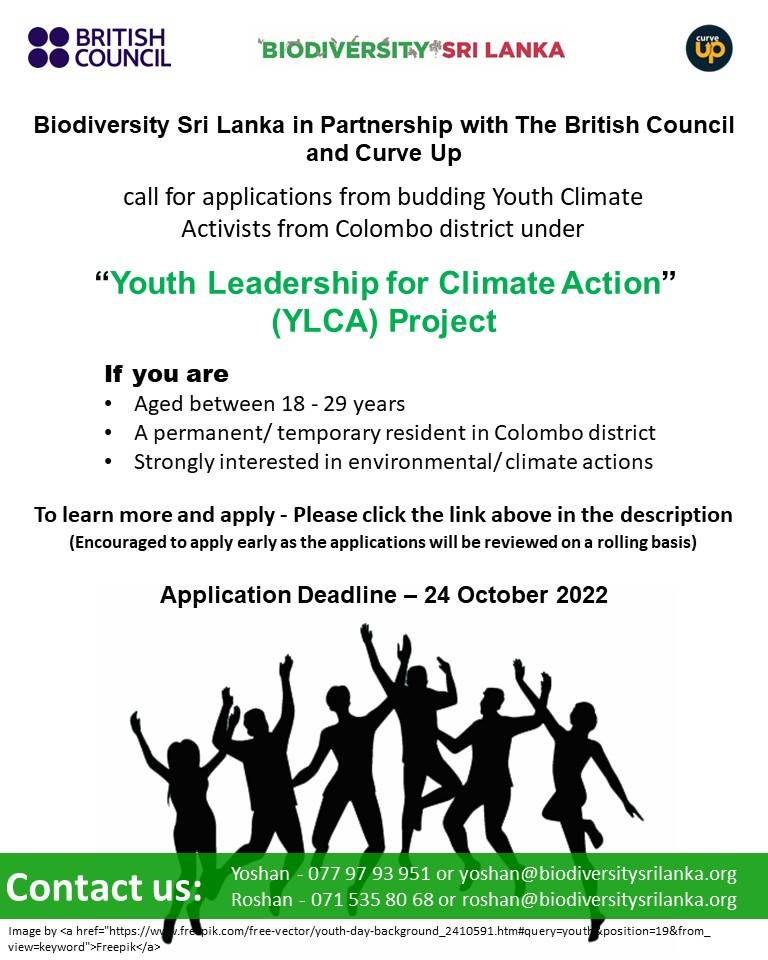
Call for applications from budding Youth Climate Activists from Colombo District under “Youth Leadership for Climate Action” (YLCA) Project
Biodiversity Sri Lanka in partnership with British Council and Curve Up
The Context
Biodiversity Sri Lanka is a national platform entirely owned and driven by the private sector established to promote strong engagement of the corporate sector in sustainable development. BSL’s overall mandate is to help raise awareness of biodiversity and sustainability issues amongst the Sri Lankan business community.
Curve Up is a pioneering education technology company in Sri Lanka. Curve Up works closely with several schools, global institutes, SMEs, and NGO communities to partner and develop solutions that are more innovative, adaptive, and effective.
The British Council has undertaken the Youth Leadership for Climate Action Project in Sri Lanka which intends to offer Sri Lankan youth active at community level climate action the opportunity to develop their knowledge, skills, and networks to offer better, more impactful, and sustainable solutions to pressing social, economic, and environmental climate-related issues through the engagement of local communities. Together, Biodiversity Sri Lanka and Curve Up carry out Colombo District’s project activities of the YLCA Project.
Opportunity for Youth
The project will run from October 2022 to March 2023, during which time the selected youth will undergo a series of intensive residential training programs on topics related to climate change, project management, and personality development. Upon completion of all the training sessions, youth are required to develop and implement a Community Action Project (individual or group) related to Climate Change within Colombo District in keeping with the project’s timeline.
Who may apply,
- Age between 18-29 years
- A permanent/ temporary resident of the Colombo district
- Available to take part in residential training (9 days of residential training in 3 segments) and subsequent community actions
- Strong interest and commitment for environmental/ climate action
- Should be able to carry out Community Intervention/ Action Project within Colombo District
- Ability to work effectively with people of diverse backgrounds, genders, ethnicities, and religions.
- Good communication skills in Sinhala or Tamil (English is not essential)
- Being a member of a community-based organization or a Youth Club is desirable
- This call is open and inclusive. All are encouraged to apply if you match the eligibility criteria given above etc.
To apply please visit the below link.
Sinhala: https://forms.gle/43E5BDEf7yQqDNcLA
English: https://forms.gle/YT92osUdb7Wmrgbe9
Tamil: https://forms.gle/hwUExaP7WArUL18eA
The applications will be reviewed on a rolling basis so we would recommend applying early. The deadline for submitting applications is 24 October 2022.
For any queries, please contact Yoshan at [email protected] or 0779793951 or Roshan at [email protected] or 0715358068

In Conversation
This month we met with Rookantha Rajapakse, Manager Forestry & Certifications of Lalan Agri Diviision, Lalan Group in our “IN CONVERSATION” segment. Rookantha serves as the BSL Focal Point for General Member Lalan Rubbers.
BSL: Briefly introduce your company and yourself
A: Lalan Agri Division (LAD) which is one of Sri Lanka’s highest-yielding rubber plantations, is a part of Lalan Group, a pioneer in rubber manufacturing in South Asia. LAD’s commitment to the highest standards of quality forms the backbone of its operations. LAD’s 15 estates located in the Kegalle and Kurunegala Districts in Sri Lanka spans over some 9000 hectares of land, where a multitude of crops have been cultivated including rubber, coconut, cinnamon, oil palm, tea, and forestry. The estates engage over 3000 employees – skilled and unskilled workers, staff and management personnel. Crop diversification has helped LAD in enhancing land productivity of the estates which has directly resulted in the increase of worker earnings. The diversified crop portfolio provides LAD with a natural hedge against adverse impacts from environmental factors, plant diseases and price fluctuations in commodity markets, making LAD’s operations more sustainable. The varying range of crops helps in improving bio diversity of these large areas of estate lands and in maintaining the ecological balance of the environment.
I have been with the Company for over ten years, and at present hold the position of Manager, Forestry and Certifications. I earned my Bachelor’s degree in Science from the University of Sri Jayewardenepura, and my Master’s degree in Business Administration from Cardiff Metropolitan University.
BSL: What drives your sustainability agenda, and what are the key focus areas?
A: We are FSC™ certified (FSC-C101709) and have complied with the FSC standards since 2010. Due to sustainability compliance, we are in a favorable position to measure and comprehend, our economic, environmental and social impacts to our stakeholders. The company provides a host of facilities to all employees and their families on the estates, regardless of employment status, including housing, medical care, preschool facilities and pre- and post-natal care. The LAD managed estates have a residential population of approximately 15,000, and are the direct beneficiaries of the estate operations. It is believed that a similar number or more persons (such as contractors, suppliers who transact with the estates and their families) could be identified as indirect beneficiaries of these estate economies. We are especially proud of the high standards of agricultural practices that we adopt and the way we train and develop our employees, and how much we care about protecting the environment.
BSL: Give us an outline of your current sustainability initiatives/ Projects
A: Since its inception LAD has been engaged in carrying out social welfare projects that benefit not only the communities within our estates, but also the population of the villages and towns in the vicinity of its estates. Since 2013 these activities have been expanded with additional funding sourced from the Fair Rubber Organization. So far, we have completed over 100 projects worth Rs 46 million benefitting significant number of beneficiaries. We carry out these projects focusing on the 17 Sustainable Development Goals, to achieve a better and more sustainable future for all. Social welfare projects completed so far include provision of access to clean water, improving the living conditions in worker housing, providing facilities and assistance for children’s education & growth, provision of medical facilities, assisting in the maintenance of religious and culturally significant locations, provision of sports/recreational facilities & encouraging the communities to participate in sports. The restoration of Sri Lanka’s only motorable suspension bridge located in Deraniyagala, Sri Lanka, which spans over the Seethawaka River, and its periodic maintenance is a significant highlight.
Suspension bridge – Reucastle Estate, Deraniyagala
Land is one of the most valuable resources of a plantation. LAD invests heavily in the soil conservation and moisture retention activities, through draining, terracing, erosion control, etc.
BSL: What are your company’s key achievements in the sustainability domain and the reasons behind your success?
A: The company has managed to reduce its CO2 emissions by an average of 4,677 tons per year, through the restoration of 225 hectares of degraded land by planting of Rubber. The company has been able to neutralize some emissions from downstream glove manufacturing activities using the carbon credits earned through the emissions reduced from the aforementioned project. Our most recent Biodiversity assessment, conducted across all 15 estates with the help of Prof. Devaka Weerakoon and his team of experts from the Colombo University, resulted in the sighting of the dragonfly “Flint’s Cruiser (Macromia flinti)” in a riverine habitat on one of our estates. This detection is particularly significant because this would be the first confirmed record of this critically endangered species in 50 years, which had been previously listed as a Data Deficient species due to a lack of records.
Flint’s cruiser – Macromia flinti (Photo credit: Mr. Amila Sumanapala)
The company’s efforts in protecting the environment have been significant. With the company’s help, over 60 High Conservation Value (HCV) sites and approximately 850 hectares of forest lands have been conserved. In addition, all possible steps have been taken to preserve the stream reservations as well as the mountain tops located in the agricultural fields. The above achievements would not have been possible without the conscious decisions of our management directed at the creation of long-term value & sustainability, and their general strategic supervision. This enthusiasm permeates throughout the organization, resulting in everyone working together to achieve the company’s sustainability objectives.
BSL: What are the challenges you see in driving your sustainability agenda forward in the current, extremely volatile business context?
A: It is problematic that the country’s PESTEL factors are unclear and uncertain. In the post-Covid era, the industry has been severely affected by several diseases, shortages of workers, short-sighted and adhoc decisions of the policy makers and the global economic downturn. However, the company’s commitment to sustainability remains unchanged as we continue to pursue success in all areas.
BSL: Any interesting future plans?
A: Despite all the country’s issues, the company is committed to expanding its operations. The triple bottom line is where we will be putting our efforts into bettering our current practices. In order to better equip its workforce, the company will continue to focus on empowering the workers, while helping them with welfare projects in conjunction with the Fair Rubber Organization.
BSL: Any message/s/ recommendation/s to BSL Members aspire to be leaders in Corporate Sustainability?
A: The secret to success is the desire to excel at what you do, and to do it with purpose. Do not engage in sustainability work for the sole purpose of enhancing your company’s image. This is not a simple task, as you must collaborate with individuals at varying levels and categories while facing multiple obstacles. However, you will be proud of the outcomes, and the environment will improve over time.
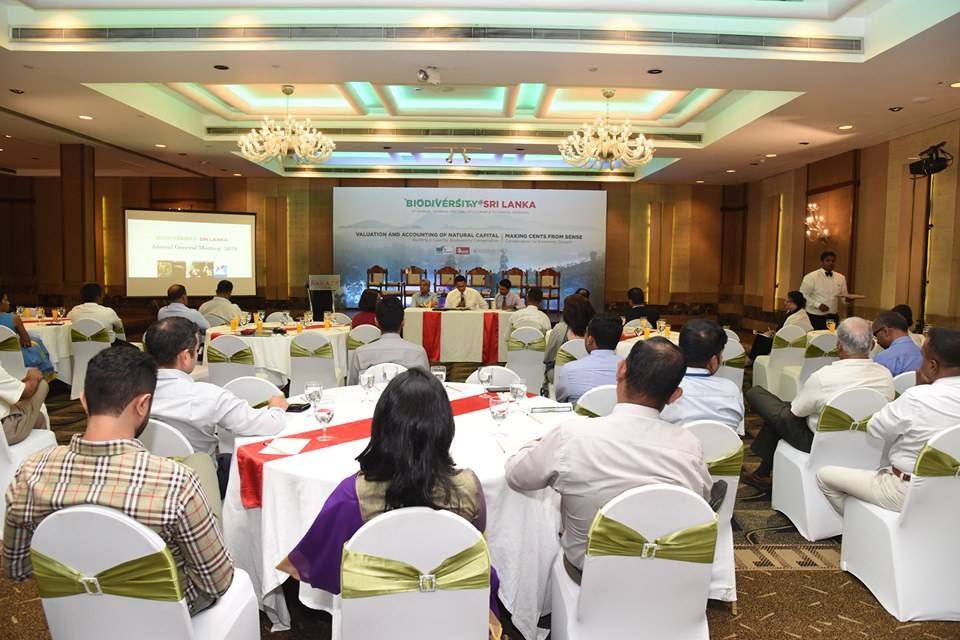
Join us for BSL’s Annual Technical Sessions, AGM & CEO Forum on the 2nd & 3rd November 2022
SUSTAINABLE USE – PATHWAYS INTO THE FUTURE
Session 1: 09.00 am – 10.30 am
Innovative Financing mechanisms for SDG implementation in Sri Lanka
Auditorium of the Bandaranaike Center for International Studies (BCIS)
The 2030 Agenda for Sustainable Development and the Sustainable Development Goals (SDGs), adopted in 2015, aim to provide a common, integrated global framework for peace and prosperity for people and the planet, now and into the future. Although the 2030 Agenda presents SDGs independently, it highlights that they are indivisible and emphasizes the importance of understanding and acting upon the complex spatial and temporal interactions that exist between SDGs and the need to ensure that progress made in some sectors or countries does not hinder progress in others.
Sri Lanka’s commitment to achieving the SDGs is explicit in its continued pursuit of national policies and development plans and programmes in alignment with the SDGs. The Government of Sri Lanka and UNDP in Sri Lanka recently announced the launch of the Sri Lanka SDG Investor Map, a market intelligence tool that seeks to direct private capital where Sri Lanka’s SDG priorities, Government policy and market opportunity intersect, as the country seeks to rebuild its economy sustainably, using the SDG framework as its guide.
Innovative financing mechanisms become imperative to synergize the government, private sector, and capital markets to generate the additional resources needed to finance the SDGs. The SDG Investor Map is therefore a timely intervention that would provide interested investors with the required market information relating to potential investment opportunity areas. While there is much to be done, there is a great opportunity for the private sector to integrate sustainability and the SDGs into their investments and businesses to help Sri Lanka build forward better. This coupled with the adoption of the SDG Impact Standards which guides the private sector to manage their impact, will further the country’s ability to build a more resilient future, leaving no one behind.
In partnership with the Sustainable Development Council, the session will focus on the SDG Investor Map and Green Financing Support for SDG implementation in Sri Lanka including an engaging panel discussion with diverse stakeholders.
Session 2: 11.00 am – 12.30 pm
Aligning business action with the Post-2020 Global Biodiversity Framework and 2030 Action Targets
Over the last two years, we have seen significant engagement from 1,100 companies that are advocating for a nature-positive world, and hundreds of leading companies making commitments and applying available tools and data to help implement and deliver the relevant targets included in the Post-2020 Global Biodiversity Framework (GBF). There are more targeted resources on the way to support business implementation, such as the Science Based Targets Network (SBTN) and the Taskforce on Nature-related Financial Disclosures (TNFD).
The Convention on Biological Diversity’s Conference of Parties 15 (COP15) is now set to take place at the headquarters of the Secretariat of the Convention on Biological Diversity (SCBD) in Montreal, Canada from 5 to 17 December 2022. Member states will adopt the Post-2020 (GBF) at COP 15, which will hopefully provide a clear direction and strong signal on the need to halt and reverse nature loss by 2030. Based on Target 15 – Role of business, there has been significant momentum in favor of mandatory requirements for businesses and financial institutions to assess and disclose their impacts and dependencies on nature. The need for business and financial institutions to reduce their negative impacts on nature by at least half and increase positive impacts has also been supported by many countries during the negotiations but will need further discussion in Montreal.
The session will engage with experts from the World Business Council on Sustainable Development (WBCSD), discuss road maps that break down what nature-positive means for business to help companies understand what nature positive means for their sector and break down key actions businesses need to consider to address nature loss. These Roadmaps include guidance on assessing dependencies, measuring impacts and tracking efforts to halt and reverse nature loss across the value chain.
Session 3: 02.00 pm – 04.30 pm
Building Partnerships for Science-based Ecosystem Restoration
Actions that sustain and restore diverse and functioning ecosystems are essential for human safety, health and prosperity. With 2021–2030 declared as the United Nations Decade on Ecosystem Restoration, efforts are scaling up to halt, reverse and prevent future degradation of ecosystems worldwide, including natural, semi-natural, managed, production and urban ecosystems. Sustaining and restoring ecosystems requires public support and leadership from nation-states and civil society, underpinned by sound science, and is driven by the collective action of multiple actors whose actions impact and are impacted by ecosystems. To move the goals of the UN Decade on Ecosystem Restoration forward, this session will demonstrate, show case and address through BSL’s successful public private people’s partnerships – fundamental questions, and present key messages to bring effective and long-term action, providing recommendations on how to build the ecosystem restoration movement.
Be a part of LIFE: Breathing new life into reality.: Beyond five years of restoration in Kanneliya Conservation Forest, Halgahawala, Opatha.
CEO Forum on Climate Financing
Thursday 3rd November 2022: 5.00 – 6.30 pm
Grand Ballroom – Ramada Colombo
Climate finance seeks to support mitigation and adaptation actions that will address climate change. The Convention, the Kyoto Protocol and the Paris Agreement call for financial assistance from Parties with more financial resources to those that are less endowed and more vulnerable. This recognizes that the contribution of countries to climate change and their capacity to prevent it and cope with its consequences vary enormously. Climate finance is needed for mitigation, because large-scale investments are required to significantly reduce emissions. Climate finance is equally important for adaptation, as significant financial resources are needed to adapt to the adverse effects and reduce the impacts of a changing climate.
In accordance with the principle of “common but differentiated responsibility and respective capabilities” set out in the Convention, developed country Parties are to provide financial resources to assist developing country Parties in implementing the objectives of the UNFCCC. The Paris Agreement reaffirms the obligations of developed countries, while for the first time also encouraging voluntary contributions by other Parties. Developed country Parties should also continue to support country-driven strategies, and taking into account the needs and priorities of developing country Parties. Such mobilization of climate finance should represent a progression beyond previous efforts.
It is important for all governments and stakeholders to understand and assess the financial needs of developing countries, as well as to understand how these financial resources can be mobilized. Provision of resources should also aim to achieve a balance between adaptation and mitigation.
Overall, efforts under the Paris Agreement are guided by its aim of making finance flows consistent with a pathway towards low greenhouse gas emissions and climate-resilient development. Assessing progress in provision and mobilization of support is also part of the global stock take under the Agreement. The Paris Agreement also places emphasis on the transparency and enhanced predictability of financial support.
The proposed policy dialogue will explore the feasibility of promoting Climate Financing and understanding how these financial resources can be mobilized to achieve a balance between adaptation and mitigation.
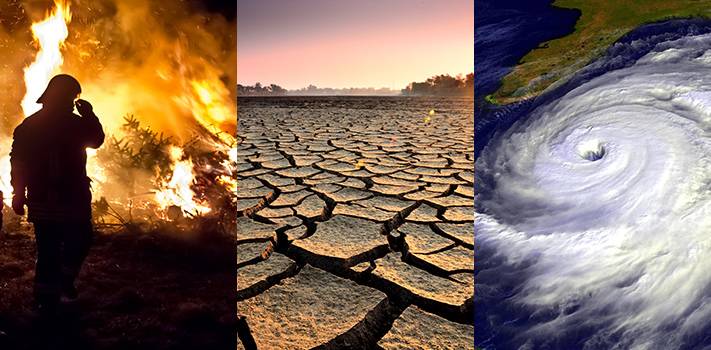
Zero Emissions Day – Zero is the Target
Did you know that September 21st is Zero Emissions Day? The purpose of this day is to give our planet a break from fossil fuels and what they release into the air, at least for one day, every year. This encompasses greenhouse gasses, polluting substances, microparticles, and other things that are harming our planet. The importance of Zero Emissions Day is paramount because it aims to encourage the use of renewable energy sources, as opposed to finite fossil fuels. The primary message associated with the day is “Giving our Earth a day off every year.” This day is devoted to increasing public awareness of potential sources of air pollution and viable solutions for reducing the harm that our everyday emissions may do to the environment. It is an excellent chance to learn about renewable energy sources and natural resources that may be used instead of sources of air pollution.
Biodiversity Sri Lanka celebrated Zero Emissions Day in partnership with its Patron Member, Diesel & Motor Engineering PLC (DIMO). Prof. Ajith de Alwis, Dean of the Faculty of Graduate Studies of the University of Moratuwa focused on emissions from the food and agriculture sector, which is not always considered to be important. He highlighted that one of the primary sources of nitrogen emissions is from fertilizer – emissions from this source being 300 times more dangerous than from carbon dioxide emissions, having detrimental impacts on the environment, including climate change. In order to survive, guaranteeing adequate food security for the people whilst also maintaining the safety of the environment, stringent and responsible management measures must be put in place.
Since all main pollutants have an effect on the climate and the majority of them come from the same sources as greenhouse gases, which cause global warming, air pollution, and climate change are intimately related. Additionally, pollution particles are harmful to human health, which results in acute illnesses like asthma. The right to raise children in a clean and healthy environment will be violated if one lives in an area where harmful chemicals are present in the air. Both children and adults will have a variety of behavioral and mental health concerns as a result. Simply said, it appears that in such a stressful atmosphere, individuals cannot appreciate the serenity and beauty of nature. Enhancing air quality will help our environment, economy, and health.
To lessen air pollution, it would be fantastic if we could lower our carbon footprint and greenhouse gas emissions. Use public transportation whenever available, ride your bike instead of driving, and unplug your electronics when not in use to conserve energy. Companies must embrace environmentally friendly activities including recycling, using renewable energy, and promoting sustainable methods, create and introduce newer, more environmentally friendly goods and services, and raise their positive carbon footprint. As a nation, we can generate electricity using natural resources and renewable energy sources like wind and solar energy.
Let’s celebrate our planet and learn how we can all work together to safeguard nature!
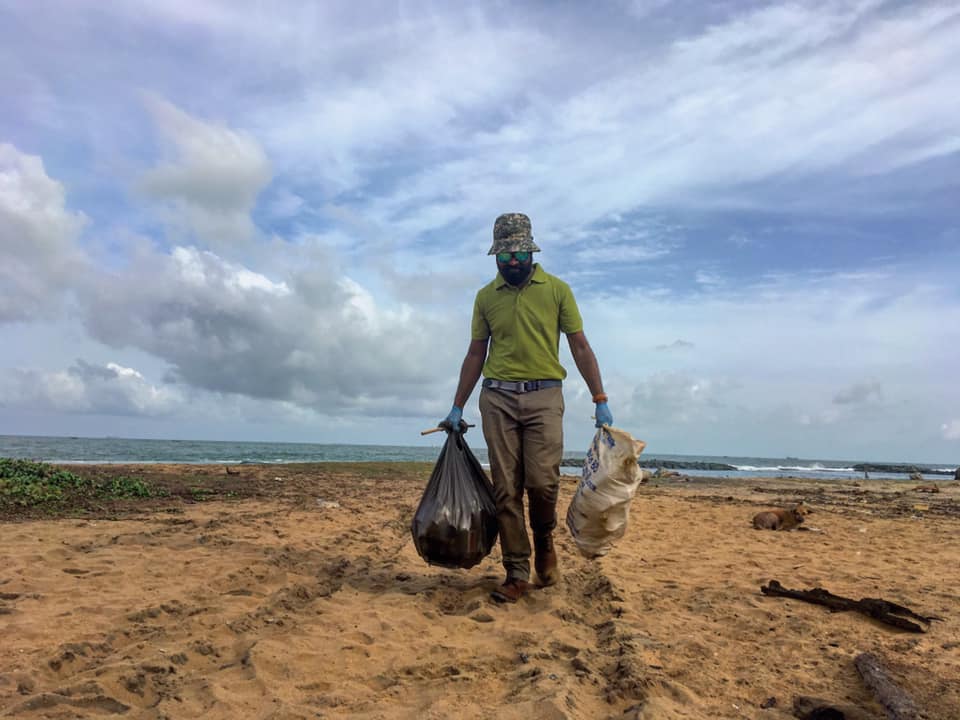
Joint Action on World Cleanup Day 2022
World Cleanup Day is an annual global social action program aimed at combating the global solid waste problem, including the problem of marine debris. World Cleanup Day harnesses the power of people around the world to achieve incredible things by joining together. Its beauty lies in co-operation and collaboration: building bridges between disparate communities, and including all levels of society – from citizens to business, to government. This year’s World Cleanup Day took place on September 17th, 2022.
On this day, Biodiversity Sri Lanka (BSL) collaborated with the Marine Environment Protection Authority (MEPA), its Patron Member, Citizens Development Finance PLC (CDB), and SME Member Mai Globe Travel to conduct two beach cleanup events in Modara- Pollwatte and Wellawatta. Our Patron Member, Abans Cleantech (Pvt) Ltd, the environmental management arm of the Abans Group responsibly disposed of the collected waste at their recycling facility.
CDB employees alongside their family members participated in this worthy cause. An 800m beach stretch, polluted with lots of plastics, glass, rubber, and other debris was cleaned up. More than 100 poly sack bags full of segregated waste and debris were collected from the stretch. This clean-up initiative was a part of BSL’s ‘Life to our Beaches’ Program which is a public-private-community partnership for maintaining Sri Lankan beaches clean and healthy. CDB has partnered with BSL under this program to look after the Modara- Polwatte beach stretch for a year. After the initial clean-up was done on World Cleanup Day, the stretch was handed over to the appointed Samurdhi beach caretaker for maintenance under the supervision of MEPA and BSL.
Mai Globe is a travel agency based in Sri Lanka and Vietnam, committed to improving sustainability and responsible tourism. As a part of its commitment to the planet, Mai Globe undertook the beach clean-up in Wellawatta. 15 employees were engaged in the clean-up, cleaning a 300m beach stretch. The marine debris collected included PET bottles, glass bottles, cloths, Styrofoam, and e-waste items, amounting to 20 poly sack bags.
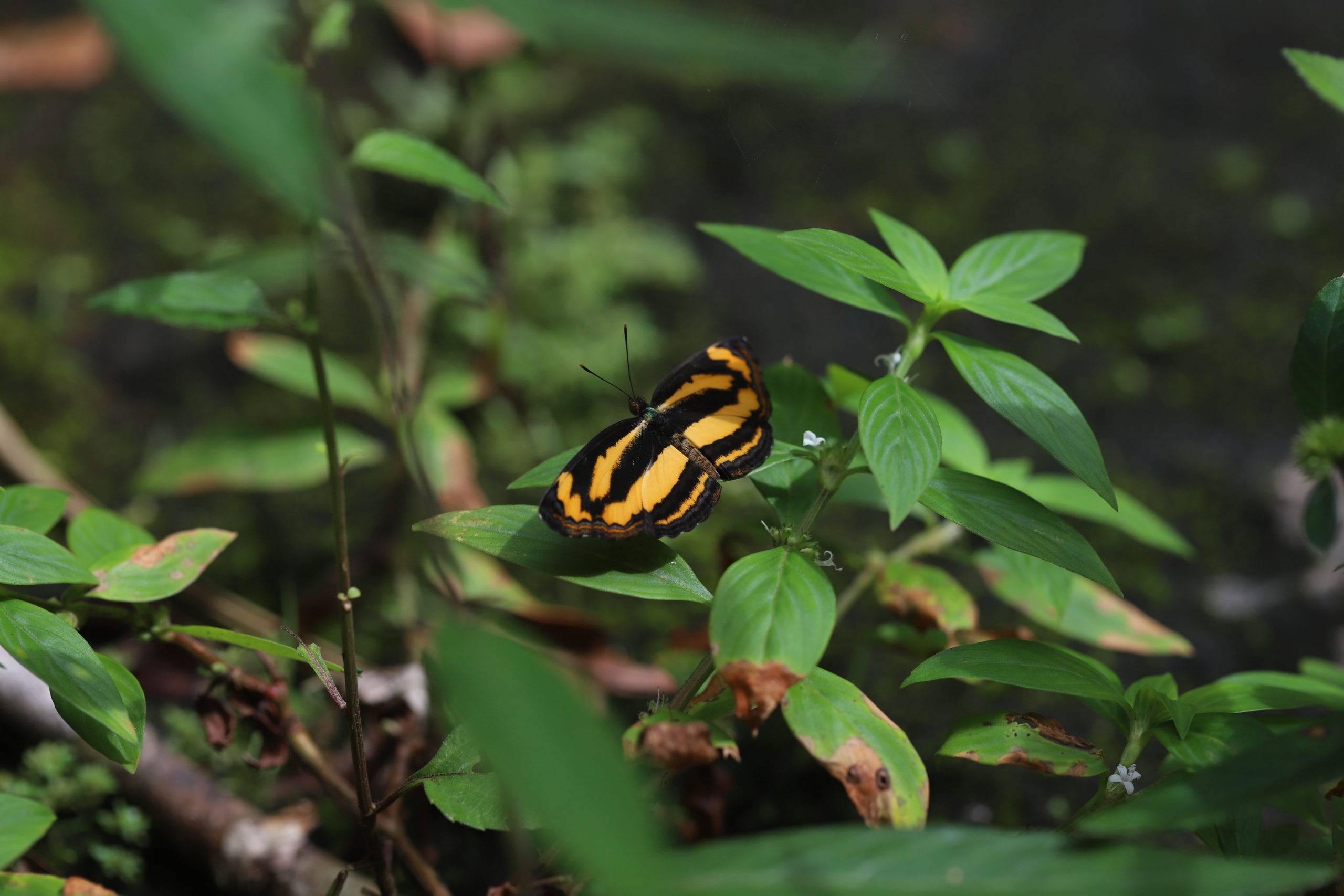
Measuring contributions towards biodiversity targets – Using the Species Threat Abatement and Restoration (STAR) metric
Biodiversity is declining at a faster rate than at any other time in human history, driven by unsustainable economic activity. Businesses, governments, and civil society around the world lack the ability to measure their potential positive impacts on biodiversity in comparable and consistent ways. For example, species are being lost through the conversion of natural habitats to agriculture, forestry and urban expansion, and through poaching, fishing, or collection for local consumption or international trade. Consequently, reversing species loss requires action from a range of actors – national and subnational governments, businesses, industries, cities, civil society, the finance industry, and investors.
Why is it important?
The ‘transformational change’ required to bend the curve of biodiversity loss will only be realized if everyone can identify and deliver their potential contributions towards global biodiversity targets. As with climate change mitigation, it is essential to quantify contributions by specific actors to achieve global impact.
The post-2020 global biodiversity framework will guide global conservation action over the next decade, aligned in turn to the 2030 Agenda for Sustainable Development. To deliver the post-2020 framework, we need to be able to quantify and add up potential contributions to biodiversity conservation from around the world. The ability to quantify contributions will make it easier to reward positive action, as well as highlight where change is needed to mitigate negative impact. Enabling effective conservation action would in turn improve human well-being, prosperity, and health, which are inextricably linked to the health of the natural world.
What can be done?
The Species Threat Abatement and Restoration (STAR) metric allows businesses, governments, and civil society to quantify their potential contributions to stemming global species loss and can be used to calculate national regional, sector-based, or institution-specific targets. The STAR metric (Mair et al. 2021) was developed based on the IUCN Red List of Threatened Species, in a collaboration between 55 organizations. The IUCN Red List is the most comprehensive global assessment of the status of biodiversity.
Because biodiversity is distributed unequally around the world, STAR assesses the potential of specific actions at specific locations to contribute to international conservation targets. STAR estimates the contribution of two kinds of action to reduce species extinction risk – threat abatement and habitat restoration. This makes it possible to compare specific threat abatement and habitat restoration actions in different places toward reducing global species extinction risk, which will help companies, countries and others plan their conservation efforts. It also permits actors to add up their total contributions.
Setting science-based targets
STAR scores for a particular location (which can be of any size e.g., a site, landscape, country) show the potential contribution of conservation or restoration actions in that location to reducing the extinction risk for all species globally. STAR can therefore be used to establish science-based targets that reflect contributions from individual actors towards goals under the post-2020 global biodiversity framework.
The STAR metric can be used by individual institutions. For instance, an extractives company can use STAR to measure the impact of restoring habitat for threatened species across a network of mines.
The STAR metric is available for use by businesses through the Integrated Biodiversity Assessment Tool (IBAT), and for non-commercial users through IBAT and likely also additional third-party platforms.
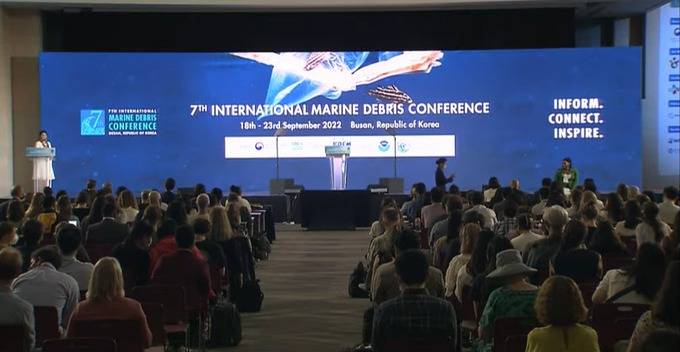
CCC and BSL take the Sri Lankan EPR Journey on Plastics Waste Management to the 7th International Marine Debris Conference (7IMDC) held from September 18th to 24th in Busan, South Korea
Our Board Director Mr Chandraratne Vithanage and Programme Manager, Roshan Salinda attended the world’s longest-running international conference series dedicated to the issue of marine litter and plastic pollution recently. IMDC is well-recognized as a platform for bringing together governments, industry, academia, civil society, and all relevant stakeholders to discuss the latest science, strengthen collaborations, find solutions and catalyze action to address the urgent, global problem of marine litter and plastic pollution.
The 7IMDC was held with the participation of 760 people physically, and 183 people virtually from 89 countries. The Conference had 110 sessions under 9 technical tracks, namely Monitoring, Research, Technology & Innovation, Education, Awareness & Communication, Regulation, Laws & Policy, Circularity & Waste Management, Economics, Financing & Private Sector Engagement, Sea-based Sources, and International Collaborations. There were 564 presentations and 234 posters, generating more than 130 hours of substantive content for consumption. To connect with each other, there were many opportunities and medium available throughout the conference. These include 7IMDC App, networking events such as social events and luncheons, and the Global Partnership on Marine Little (GPML) digital platform. It was inspiring to interact and see the energy of a global like-minded, passionate, rapidly growing community to tackle the marine plastic issue. The sense of purpose was noticeable among speakers to inform and drive solutions and actions while continuing to do more research on marine litter.
The Ceylon Chamber of Commerce (CCC) and Biodiversity Sri Lanka (BSL) made a joint presentation on the Sri Lankan EPR Journey on Plastics Waste to this international audience in session 5.1 titled non-state actors in governance solutions to plastic pollution. The participants were appreciative of the work carried out and suggested that Sri Lanka can generate a blueprint for industry-led volunteer EPR programs in South Asia.
The knowledge gained and connections made from 7IMDC will be extremely important for both CCC and BSL to expand and enrich joint EPR efforts.

IN CONVERSATION
In our “In Conservation” segment this month, we were happy to chat with Kshanika Goonesekera, Ph.D., Manager, Environmental Sustainability, MAS Intimates. Our Member Focal Points are the backbone of BSL.
BSL: Give us a brief introduction about your company and yourself
A: MAS Intimates is the largest subsidiary of South Asia’s largest apparel manufacturer, MAS Holdings. MAS Intimates is responsible for designing, developing, and manufacturing for some of the world’s leading lingerie brands. Over the last three and a half decades, MAS Intimates has differentiated itself in the global fashion industry through its innovation mindset, strong technical competency, and making sustainability a foundation of the product creation process. It has design and development offices in Hong Kong and Sri Lanka with a presence in New York and London. MAS Intimates is also home to 17 state-of-the-art manufacturing facilities in Sri Lanka, Bangladesh, India, Indonesia, and Kenya with a rapidly growing global footprint.
I am a molecular biologist by training with a background in ecology, microbiology, and phylogenetics, working as the Manager, Environmental Sustainability at MAS Intimates. This may not be the conventional combination of qualifications that are needed for working in environmental sustainability for an apparel manufacturer. However, I have been pleasantly surprised at how useful these skills have been when overseeing the different areas that come under my purview at MAS Intimates.
Board at Udawalawe describing the invasive removal project
BSL: What drives your Company’s sustainability agenda and what are its key focus areas?
A: MAS Intimates’ efforts to drive a positive impact on the environment are outlined in the MAS Plan for Change, a commitment to creating sustainable change under three areas of focus: products, lives, and the planet.
My role in environmental sustainability broadly focuses on both the product and planet pillars with more attention to emissions & energy, waste, chemicals, water, and biodiversity which fall under the planet pillar of the MAS Plan for Change. The key focus areas include analyzing the manufacturing footprint and ensuring that we have a minimum environmental impact, working towards reducing our absolute emissions and aligning to the Science Based Targets Initiative (SBTi), ensuring that all our facilities follow stringent chemical management guidelines so that our products and processes are free of toxic chemicals, adhering to international standards and restricted substances lists (RSLs), guaranteeing that all waste is diverted from landfill and value-enhancing all non-hazardous waste.
We also safeguard the natural ecosystem in the locality of our facilities and work to conserve and restore biodiversity. At MAS Intimates we have a team of technical experts and specialized teams located at each of our plants that ensure that these standards are maintained.
BSL: Give us an outline of your company’s current sustainability initiatives/projects
A: Sustainability became a focus over a decade ago and has been steadily growing in momentum. It is not simply a business decision anymore but a lifestyle choice.
Our commitment to renewable energy is displayed through rooftop solar installations at Vidiyal, Kilinochchi
As a global organization, our commitment to renewable energy is high and two of our facilities are already running on 100% renewable electricity, through the purchase of Renewable Energy Certificates (RECs). Another facility is in the pipeline to enter into a Power Purchase Agreement (PPA) and we are also researching the possibility of offsite renewable energy generation. Installing all our facilities with energy-efficient fixtures, machines and equipment was something we did right at the start of our sustainability journey in the early part of the 2010 decade and we are striving for continuous improvements through regular maintenance and upgrades.
An elephant is seen enjoying the vegetation in a cleared area at Udawalawe National Park
MAS Intimates is passionate about Biodiversity. We started our conservation work in Sri Lanka and as a division completed the restoration of 834 acres in 2021. A few examples of our work include removing invasive species at Udawalwe National Park, Lunugamwehera National Park and Minneriya National Park, restoring mangrove habitats in Koggala, reforestation campaigns at Rakwana, Ella and Foxhill as well as turtle conservation at Panama. Our first international conservation project was initiated in 2022 close to our facility in Kenya. This is a different project to what we have done so far and involves the Masai community in conservation through allowing wildlife to freely graze on their community land, instead of fencing these areas and inhibiting the movement of the wildlife.
Gathering of all the landowners who are partnered with us in the Kenya conservancy project
In the product space, circularity is a key driver for us as well as our customers. Creating a circular business model by bringing back products into the value chain at the end of life is important to us. As the first step, we are looking to close the loop on our waste by upcycling fabric waste back to the fabric we can use in our products. One of the biggest drawbacks is the slow pace of scaling up of available technology, due to the pandemic and now the impending economic crisis.
Apart from these focus areas, we are of course continuing to improve our standing with water consumption, chemical management, and reducing our waste. We also make it a point to take our best practices and sustainability messages to our communities. Every facility in all our global locations engages with their communities to recycle waste and establish sustainable entrepreneurs, educate the next generations on the necessity to live a sustainable lifestyle, increase green cover, and come together to clean up the community and public lands for the benefit of the community, the environment and much more.
BSL: What are your company’s key achievements in the sustainability domain and the reasons behind the success?
A: Three awards that we have won in the recent past must be highlighted here.
- Winner of the Ceylon Chamber of Commerce Best Corporate Citizen Sustainability Award 2020 for the MAS Mangroves project.
This project initiated in 2017 focuses on improving Lagoon based habitats through replantation and plant cover enrichment. Our work in mangroves also focuses on the long-term autonomy of the restored habitats by engaging and educating the local communities.
- Presidential Export Awards 2020/21
- Exporter of the Year
- Best Exporter in Product Diversification
- Contributor to Sustainable Development in Exports
Our commitment to converting our products to sustainable alternatives and pursuing new developments in sustainable categories was highlighted with this award.
- The Ceylon Chamber of Commerce Best Corporate Citizen Sustainability Award 2018. Category of Ten Best Corporate Citizens.
- Triple Bottomline Award: Environmental Sustainability (Planet).
- Category Award Winners (in 3 categories): Community Relations, Environmental Integration and Environmental Commitment.
BSL: What are the challenges you see in driving your sustainability agenda forward in the current, extremely volatile business context?
A: The impending global recession may cause the focus on sustainability to be deprioritized, even though it had been picking up momentum in the international markets. We witnessed most of our planned projects being impacted during COVID due to the lockdown. Locally the prevailing situation in the country does bring up some challenges when implementing some initiatives, however, we are unwavering in our commitment to our sustainability goals. Despite these challenges, we will continue to push forward to reach our targets as set out in the MAS Plan for Change.
BSL: Any interesting future plans
A: In an ideal world we would be able to collect post-consumer waste, and recycle it into a high-quality product which can then be re-introduced back into manufacturing streams. There are many hurdles to cross but circularity at scale is an interesting future focus. Another is expanding our commitment to renewable energy. The global energy crisis is making exploring new renewable energy avenues a non-negotiable. Sri Lanka is not geared for many renewable energy mechanisms available globally. There is a lot of potential for us in this space, therefore we have highlighted this as one of our focus areas.
On the biodiversity front, we are looking to expand our conservation work to our global production sites. How they implement projects are different to how we carry out projects locally, making this a learning curve for us. The conservation project in Kenya is a good example. We did not think that a community would readily leave their lands open to grazing wildlife and in turn predators. However, the NGO we are partnering with and the results they showed us after more than a decade of experience convinced us of the benefits to wildlife, the community as well as the ecosystem as a whole.
We have a presence in Indonesia and they are very keen on their commitment to the mangroves their approach to restoration is fueled by their passion to conserve the environment. It is truly inspirational to work with such passionate individuals.
BSL: Any message/s/ recommendation/s to BSL Members aspiring to be leaders in Corporate Sustainability?
I believe you need to be passionate about sustainability to be working in this field because it goes beyond a traditional job role. What you do from 9-5 amalgamates to your lifestyle and your set of values. If you want to make a difference in the world by conserving and creating a sustainable future and you believe that you can make that difference even though your contribution may seem modest, then let your passion drive you, and remember as the poet Julia Carney stated: “little drops of water make the mighty ocean.”




























